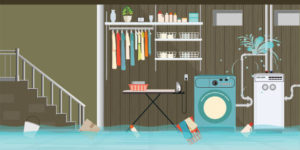How to Prevent Basement Flooding: Essential Tips for a Dry and Secure Basement
Prevent Basements are:
- A valuable part of many homes.
- Providing extra storage space.
- A place for laundry.
- Even a cozy living area.
However, they are also susceptible to flooding, especially during heavy rains or when the snow melts. Preventing basement flooding is essential to protect your property and maintain a dry, safe, and functional space. In this comprehensive guide, we will explore various strategies and techniques to safeguard your Prevent basement from the threat of flooding.
-
Sump Pumps: Your First Line of Defense
Sump pumps are invaluable tools for preventing basement flooding. These devices are typically installed beneath your Prevent basement and work tirelessly to divert water away from your home’s foundation. If you don’t have a sump pump, consider getting one installed by a professional. However, more than merely having a sump pump is required; regular maintenance is crucial.
Maintenance Tips for Sump Pumps:
- Schedule regular cleanings and inspections to ensure your sump pump is in optimal condition.
- Install a sump pump alarm to receive alerts in case of any issues or failures.
- In flood-prone areas, consider having a second sump pump as a backup.
Properly functioning sump pumps can be the difference between a dry Prevent basement and a costly flood, so pay attention to their maintenance.
-
Hose Bibs: Prevent Springtime Surprises
As winter turns to spring, it’s essential to inspect and maintain your hose bibs. The extreme cold of winter can lead to hairline fractures in these outdoor faucets, which often go unnoticed until they result in a flooded basement.
Steps to Prevent Hose Bib-Related Flooding:
- Shut off the water supply to your hose bibs.
- Cover the entire hose bib opening with your thumb.
- Turn the water back on.
- If you can hold the water in with your thumb, there may be a fracture in your pipes.
If you discover a leak, turn off the water immediately and call a plumber for repairs. Repeat this process for all hose bibs in your home to ensure they are leak-free.
-
Backwater Valve Installation and Maintenance
Installing and maintaining a backwater valve is a critical step in preventing basement flooding caused by sewer backups. This valve prevents sewage from flowing back into your basement during heavy rains or flooding.
Additional Plumbing and Drainage Maintenance:
- Regularly check for signs of clogged drains and have them cleaned as needed.
- Inspect your pipes and plumbing for damage, ensuring proper insulation.
- Examine your home’s exterior to ensure water is not infiltrating.
By addressing these plumbing and drainage issues and installing a backwater valve, you can significantly reduce the risk of Prevent basement flooding.
-
Smart Leak Detection: Modern Protection
Incorporating smart leak detection technology into your home’s security measures is a wise choice. These devices can automatically shut off the main water supply when they detect plumbing leaks, broken pipes, or other water-related issues. Additionally, they send alerts to your smartphone through a dedicated app, offering peace of mind, especially during the winter months or when you are away from home.
Benefits of Smart Leak Detection:
- Rapid response to plumbing leaks.
- Prevention of water damage and potential flooding.
- Remote monitoring and alerts for added convenience.
Investing in smart leak detection provides an extra layer of protection for your Prevent basement and the entire home.
-
Exterior Checks: Protecting Your Home from the Outside
The exterior of your home plays a significant role in preventing basement flooding. Ensure that no water infiltrates your home by following these steps:
- Gutter Maintenance: Clean and inspect your gutters regularly to prevent blockages that can lead to overflowing water.
- Foundation Inspection: Check for any signs of foundation damage and address them promptly.
- Grading and Drainage: Examine the grading around your property to ensure that water flows away from your home’s foundation.
By maintaining your home’s exterior and addressing any potential issues, you can create an effective barrier against basement flooding.
-
Insurance Coverage: Understanding Your Protection
In the unfortunate event that your basement does flood, it’s essential to understand what your insurance will cover. While insurance policies may vary, they generally cover damages resulting from sudden and accidental events, such as burst pipes or water heater leaks.
Key Points Regarding Insurance:
- Familiarize yourself with your insurance policy to understand what types of flooding are covered.
- Keep records and documentation of your basement’s condition before any flooding occurs.
- Contact your insurance provider promptly in the event of a flood to initiate the claims process.
Knowing your insurance coverage can provide financial relief in challenging situations.
-
Cleanup and Restoration: After the Flood
In the event of a Prevent basement flood, quick action is essential. Here are some steps to consider during the cleanup and restoration process:
- Safety First: Ensure that the basement is safe to enter, and turn off electricity if necessary.
- Remove Water: Use pumps, wet/dry vacuums, or professional services to remove standing water.
- Drying: Thoroughly dry the area to prevent mold and mildew growth.
- Sanitization: Clean and disinfect affected surfaces and belongings.
- Repair and Restoration: Address any structural or cosmetic damage and consider measures to prevent future floods.
Professional cleanup and restoration services may be necessary, especially for extensive flooding.
Conclusion: Prevent Basement
Preventing basement flooding is a proactive and necessary step to protect your home and belongings. By following these essential tips and incorporating modern technologies, you can significantly reduce the risk of basement floods. Regular maintenance, smart leak detection, and a clear understanding of your insurance coverage are key elements in keeping your basement dry and secure.
Remember that a dry basement contributes to a healthier living environment and safeguards your property’s value. Invest in preventative measures and stay prepared to enjoy the peace of mind that comes with a dry and flood-free basement.
You can follow us on Social Media
For more information, you can contact us!

